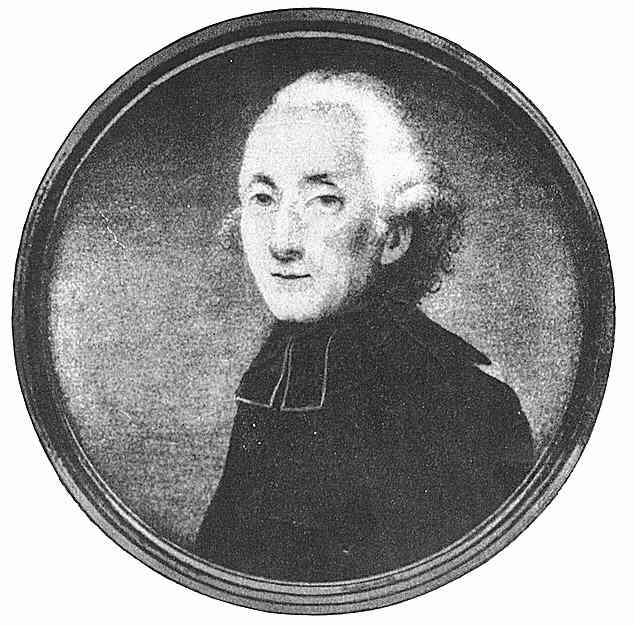
Henry Essex Edgeworth- Abbe de Firmont
Henry
Edgeworth was born in the rectory in
Edgeworthstown in 1745. When he was four, his father became a Catholic
and moved to Toulouse, taking his wife, three sons and one daughter
with him. Henry’s early education was at the University of
Toulouse, Jesuit college until 1769.
In 1769 his father died and Henry moved to Paris and attended
the College des Trente-trois at the Sorbonne. It was for poor students
and was named Trente-trois for the age of Jesus when he died. While
here, Henry lived in Seminaire des Missions Etrangeres( Rue de Bac,
opposite the Tulieres, but across the river). He worked in the slums
of Paris in the east of the city. His superior then chose him to be
confessor to Madame Elizabeth, sister of Louis XVI because he was not
well known and the priests of the Missions Etrangeres had not sworn to
submit to the constitution.
In 1793 he attended Louis XVI on the scaffold and was forced to
flee Paris, going first to Rouen then Bayeux where he stayed for three
years. In 1794 Madame Elizabeth was executed. On the 20th August 1796,
Henry escaped from France by fishing boat to the island of St.
Marcouf, then in English hands. He went from there to Scotland, via
Portsmouth, to see the Comte d’Artois and give him the last
wishes of Madame Elizabeth. On the 16th of September he left Edinburgh
for London, declining a pension from the British government.
In February 1779 he arrived at the home of the Duke of Brunswick
in Blankenburg, with papers for Louis XVIII, who was living in exile
there. He remained there with Louis until 1798 when the Duke asked
them to leave. Paul I of Russia offered them hospitality and they
departed for Mitau[Jelgava] in Latvia.
On 22nd of January 1801, dazzled by Napoleon’s victories,
Paul I asked Louis to leave Mitau[Jelgava] and on the 6th March they
arrived in Warsaw. In August they set off for Sweden, but the Abbe was
taken ill at Grodno. The King went on to Sweden. In February 1802 the
Abbe left for Mitau[Jelgava] again. With no income from his Irish
estate at Firmont, Henry finally accepts a British pension.
In 1807, French prisoner’s came to Mitau[Jelgava] suffering
from ‘jail fever’. The palace was now a hospital and despite
the Abbe’s dislike for Napoleon’s men he ministered to them
until he caught the infection and died on the 22nd May 1807. There is
a stone with an elaborate inscription by Louis XVIII in the
cemetery at Mitau[Jelgava].
EPITAPH - written by the King.
'Here lies the Very Reverend Henry Essex Edgeworth de Firmont, a
priest, of the Holy Church of God: Vicar General of the Diocese of
Paris, etc., Who following in the steps of our Redeemer, was an Eye to
the Blind, a Staff to the Lame a Father to the Poor, and a Consoler of
the Afflicted. When Louis XVI was delivered over to Death by his
impious and rebellious subjects, he gave the resolute Martyr strength
for his last struggle and pointed out to him the opening Heavens.
Snatched from the hands of regicides by the wonderful protection
of God, he voluntarily attached himself to Louis XVIII, when he
signified his wish for his services To whom and to whose Royal Family
and Faithful Comrades, he proved himself for a space of ten years, an
example of Virtue and an Assuager of misfortune. Driven from kingdom
to kingdom by the calamity of the times, he went about doing good,
ever like to Him who possessed his sole devotion. At length full of
good works, he died the 22nd May, the year of our Lord,1807, aged 62.
May he rest in peace.’
Return to Main page